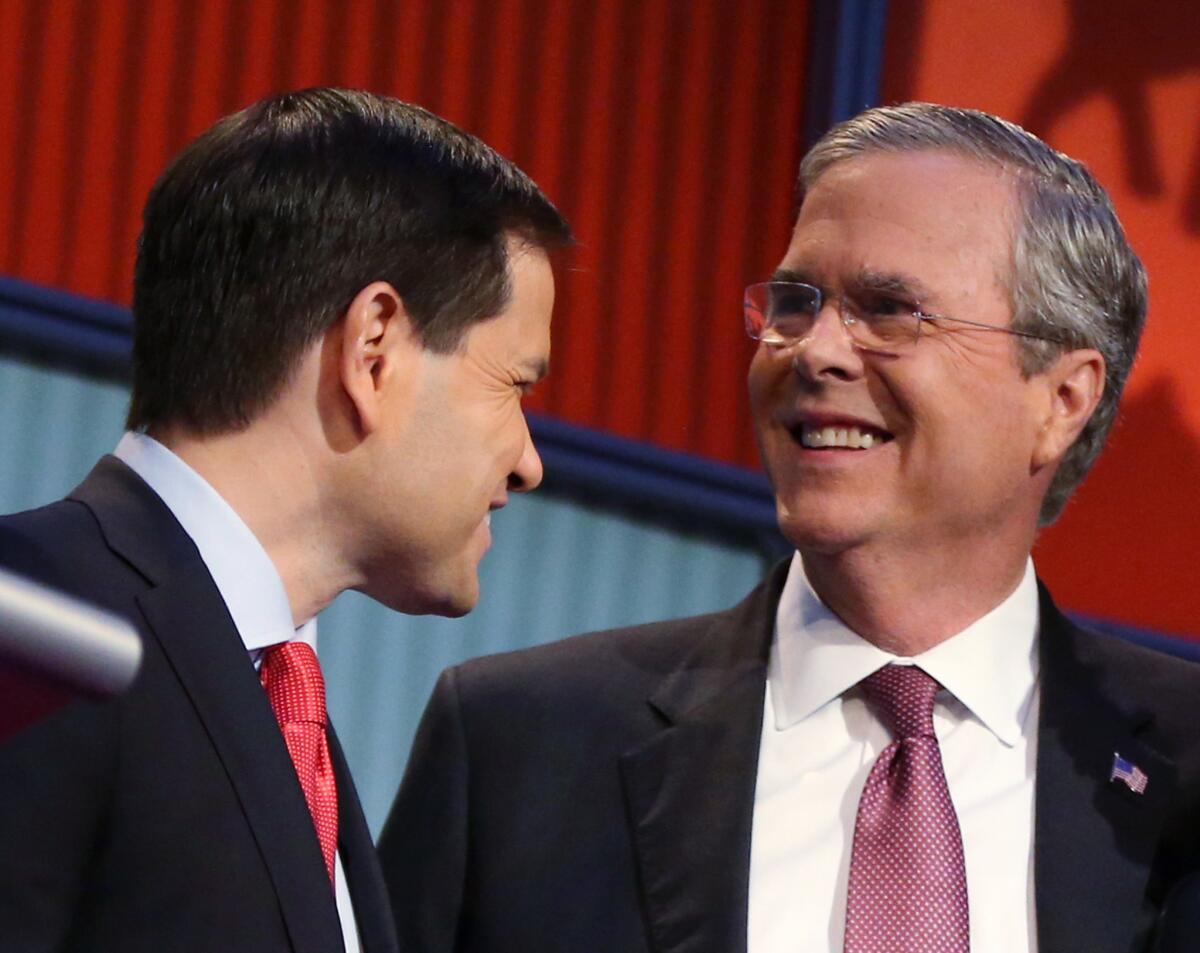Op-Ed: Voters to GOP: ‘I’m not a scientist’ won’t cut it on climate change

Republican presidential candidates Marco Rubio and Jeb Bush talk during a break at this year’s first Republican presidential debate in Cleveland.
- Share via
If the Republican Party wants to win the White House in 2016, it should take climate change seriously.
In the 2012 presidential campaign, global warming didn’t come up in any of the three debates between Mitt Romney and President Obama. That won’t be the case this campaign season, with wide swaths of America suffering through climate change-fueled record heat, rampant wildfires and historic droughts. Voters understand what’s happening, and they want the government to take action.
The question is, have Republicans gotten the message? Not quite.
In a poll conducted this spring by me and my colleagues at Yale and George Mason universities, 70% of Americans support placing strict limits on carbon dioxide emissions at existing coal-fired power plants. We also found that 75% of adults, including 63% of Republicans, support regulating carbon dioxide as a pollutant. And yet Republicans have been making the Environmental Protection Agency’s Clean Power Plan their latest punching bag.
That may help primary candidates, but it will cost the GOP in the general election. The most conservative Republicans — those who oppose climate action — hold sway in primaries. But against a Democratic candidate, the GOP will have to appeal to a wider audience to succeed.
In another Yale/George Mason poll conducted last year, we found that, overall, Americans are two times more likely to vote for a candidate who strongly supports action to reduce global warming, and three times more likely to vote against a political candidate who strongly opposes action to reduce global warming. Only conservative Republicans are slightly more likely to vote for a candidate who strongly opposes action to reduce global warming.
The changing demographics of the electorate also create an imperative for the GOP to step forward on climate change. Romney’s defeat in 2012 sent party leaders scrambling for ways to woo Latino voters. Enter Jeb Bush and Marco Rubio, widely considered the most electable of the GOP presidential contenders, due in no small part to their ability to reach that demographic group. Guess what? A recent poll by the New York Times, Stanford University and the nonpartisan think tank Resources for the Future found that 95% of Latinos think the federal government should take at least some action to tackle climate change.
What does Rubio think? He has taken the bold stance that “America is not a planet.” Bush? He said: “For the people to say the science is decided on this is just really arrogant.” (It’s not.)
This kind of rhetoric will not pay off. Our spring 2015 poll found that about twice as many Americans trust Obama and Hillary Rodham Clinton as a source of information about global warming than trust Bush and the GOP leadership represented by about-to-retire House Speaker John A. Boehner.
Does the GOP really want to keep hemorrhaging credibility on this issue?
Republicans have been groping for the right way to talk about global warming. They want to satisfy their big donors — fossil fuel companies and executives, for example, which don’t want regulations imposed on carbon pollution — without frustrating or alienating voters. Until recently, this quandary yielded tortured statements from politicians like “I’m not a scientist.”
A wiser approach for GOP candidates would be to walk out of the corner they have painted themselves into and embrace the handful of congressional GOP climate realists who recently issued a resolution recognizing human-caused climate change and calling for debate on how best to limit it.
The data are clear: Most Americans, including most Republicans and most Latinos, want to limit carbon pollution. There is only one winning position for the GOP candidates: embrace climate change, and make a forceful case for the policies that they feel will be most effective in addressing the problem. Anything else is likely to make it harder for Republicans to take back the White House in 2016.
Edward Maibach is a professor of communication and the director of the Center for Climate Change Communication at George Mason University.
Follow the Opinion section on Twitter @latimesopinion and Facebook
MORE FROM OPINION:
In California, free speech meets abortion
Grading Sacramento: Assembly Speaker Toni Atkins
Right-to-dry movement gets its day in the sun in California
More to Read
A cure for the common opinion
Get thought-provoking perspectives with our weekly newsletter.
You may occasionally receive promotional content from the Los Angeles Times.









